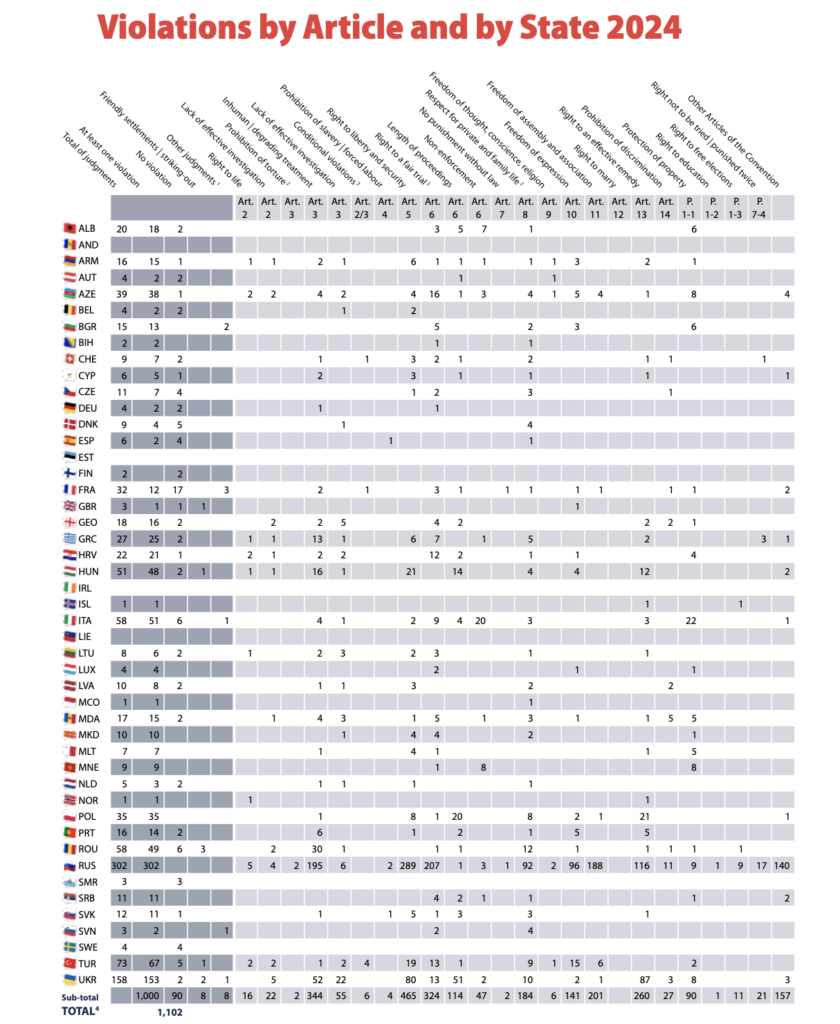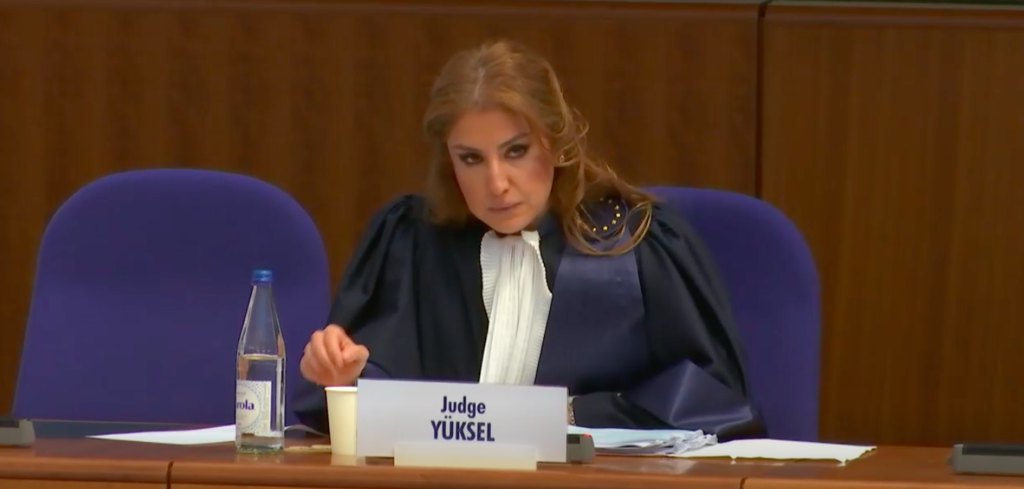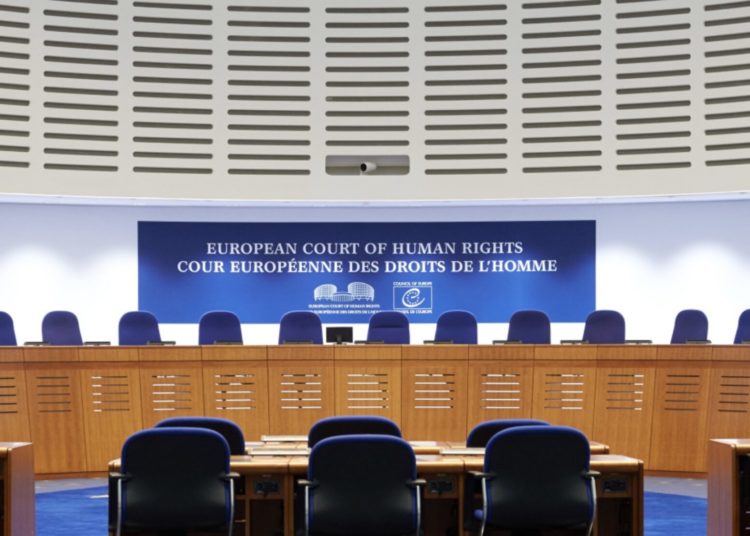Levent Kenez/Stockholm
Turkey has once again found itself among the countries with the most human rights violations in Europe, according to the European Court of Human Rights’ (ECtHR) annual report for 2024. Turkey continues to hold the top spot for the highest number of pending human rights applications before the ECtHR, with 21,613 cases still unresolved out of a total of 60,350, accounting for 35.8 percent of all pending applications. Russia follows with approximately 8,150 pending cases, while Ukraine has 7,700, Romania 3,850 and Greece 2,600. The number of Turkish cases represents a significant portion of the court’s backlog, indicating the scale of human rights concerns in the country. The report further reveals that Turkey has consistently been among the top violators of the European Convention on Human Rights (ECHR), with systemic legal and judicial shortcomings leading to numerous adverse rulings.
In 2024 Turkey was frequently cited for violations concerning the rights to a fair trial and freedom of expression as well as arbitrary detention. According to the latest data from the ECtHR on violations of the ECHR by article and country, 67 out of 73 cases brought against Turkey were found to involve at least one breach of the convention. Among these, 19 cases concerned violations of the right to liberty and security, 15 dealt with infringements of the right to freedom of expression, 13 involved violations of the right to private and family life and six related to breaches of the right to freedom of assembly and association. The statistics also revealed a decline in the number of friendly settlements in Turkey-related cases, dropping from three in 2023 to just one in 2024.
Many of these violations involve prolonged pretrial detention, politically motivated judicial rulings and excessive restrictions on freedom of expression. The use of counterterrorism laws against journalists, politicians and human rights activists remains a key concern in Turkey’s ECtHR record.

There were 73 judgments on cases from Turkey in 2024, with 67 finding at least one violation of the ECHR. This is particularly significant, as Turkey remains a member of the Council of Europe, unlike Russia, which was expelled in 2022. The data further reveal that Turkey’s standing has not improved in recent years as it continues to generate a high volume of cases before the court.
The report notes that Turkey’s figures are particularly concerning in comparison to other countries with similar populations. With over 21,600 pending applications, Turkey significantly surpasses countries like Romania (3,847) and Greece (2,613) in human rights-related complaints. These numbers indicate ongoing systemic issues within Turkey’s judicial and legal framework.
The Turkish government has faced criticism over its reluctance to comply with ECtHR rulings, often delaying the implementation of judgments or rejecting them outright. The Council of Europe has previously issued warnings to Ankara regarding its non-compliance with landmark cases. However, the Turkish government firmly rejects criticism regarding its record with the ECtHR and the alleged failure to implement its rulings. Justice Minister Yılmaz Tunç dismissed such claims as disinformation, stating, “Turkey’s compliance rate with ECtHR rulings stands at 89 percent, while the European average is 79 percent.”
Minister Tunç, in a live interview on Habertürk TV on February 7, emphasized that Turkey has made significant progress in reducing outside influence on the judiciary and strengthening the principles of the rule of law. “Our judiciary, which aligns with the national will and believes in the rule of law, is performing its duties properly,” he stated.
However, critics argue that the government’s claimed compliance with ECtHR decisions is largely procedural and does not result in meaningful changes for defendants. While the government cites statistical adherence to rulings, in practice, retrials often do not lead to the release of detainees, and requests for acquittal or release are frequently denied. This raises concerns among human rights organizations that the implementation of ECtHR rulings remains superficial, with judicial processes reopening without substantive improvements for those affected.
Unless significant reforms are implemented, Turkey’s human rights reputation is likely to face further deterioration in the international arena. The ECtHR’s findings reinforce concerns regarding Turkey’s commitment to upholding democratic principles and legal protections for its citizens.

Meanwhile, concerns over the impartiality of Turkey’s representative at the ECtHR persist. Turkish Judge Saadet Yüksel has been described in Strasbourg circles as a “Trojan horse” due to her perceived bias in cases involving the government of President Recep Tayyip Erdogan. Yüksel, the youngest judge on the court, was appointed in 2019 after Turkey faced rejection of several previous nominees by the Parliamentary Assembly of the Council of Europe (PACE). Human rights organizations have raised alarms over her close ties to Turkey’s ruling Justice and Development Party (AKP), particularly given that her brother, Cüneyt Yüksel, is a senior AKP lawmaker and chairman of the parliamentary Justice Committee. Cüneyt Yüksel has supported legal reforms that critics claim are designed to suppress political opposition, including a recent law that facilitates labeling dissidents as foreign-funded spies.
Human rights observers note that Saadet Yüksel has consistently ruled against decisions that would favor opponents of the Erdogan government.












